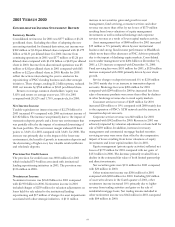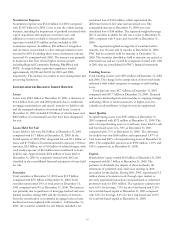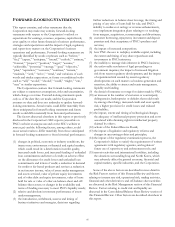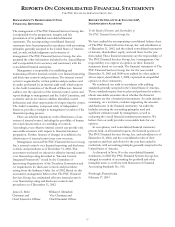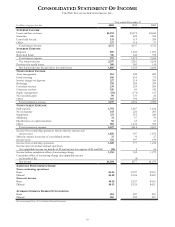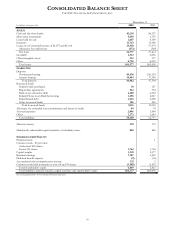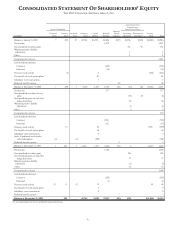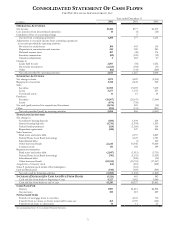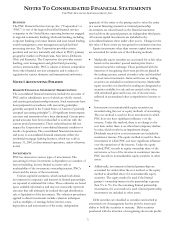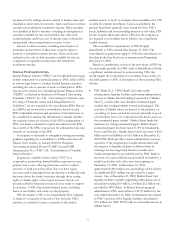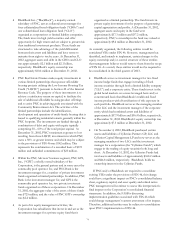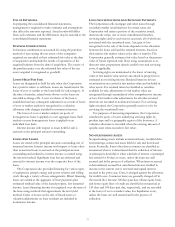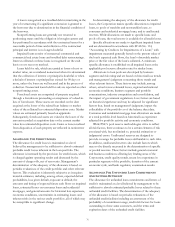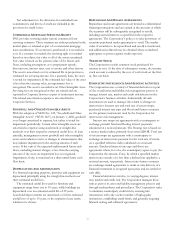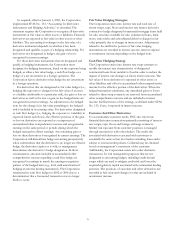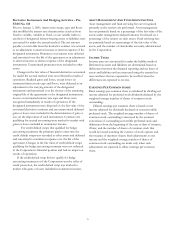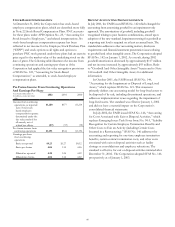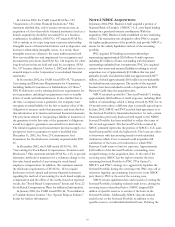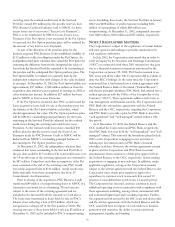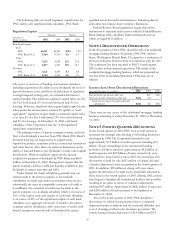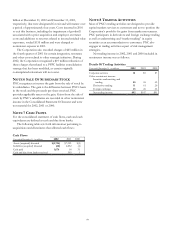PNC Bank 2002 Annual Report Download - page 76
Download and view the complete annual report
Please find page 76 of the 2002 PNC Bank annual report below. You can navigate through the pages in the report by either clicking on the pages listed below, or by using the keyword search tool below to find specific information within the annual report.74
• BlackRock Inc. (“BlackRock”), a majority-owned
subsidiary of PNC, acts as collateral asset manager for
four collaterialized bond obligation funds (“CBOs”) and
one collaterialized loan obligation fund (“CLO”)
organized as corporations or limited liability companies.
The funds invest in high yield securities and offer
opportunity for high return and are subject to greater risk
than traditional investment products. These funds are
structured to take advantage of the yield differential
between their assets and liabilities and have terms to
maturity from eight to twelve years. At December 31,
2002, aggregate assets and debt in the CBOs and CLO
was approximately $2.1 billion and $2.1 billion,
respectively. BlackRock’s equity ownership was
approximately $10.4 million at December 31, 2002.
• PNC Real Estate Finance makes equity investments in
various limited partnerships that sponsor affordable
housing projects utilizing the Low Income Housing Tax
Credit (“LIHTC”) pursuant to Section 42 of the Internal
Revenue Code. The purpose of these investments is to
achieve a satisfactory return on capital, to facilitate the
sale of additional affordable housing product offerings
and to assist PNC in achieving goals associated with the
Community Reinvestment Act. The activities of the
limited partnerships include the identification,
development and operation of multi-family housing that is
leased to qualifying residential tenants generally within the
PNC footprint. The investments are funded through a
combination of debt and equity with equity typically
comprising 30 – 60% of the total project capital. At
December 31, 2002, PNC’s maximum exposure to loss
resulting from those LIHTC investments in which PNC
owns a 50% or greater interest and which may be subject
to the provisions of FIN 46 was $142 million. This
represents the combination of a recorded basis of $119
million and unfunded commitments of $23 million.
• Within the PNC Advisors’ business segment, PNC GPI,
Inc., (“GPI”) a wholly owned subsidiary of the
Corporation, is the general partner and in some cases the
commodity pool operator for, and PNC Bank is the
investment manager for, a number of private investment
funds organized as limited partnerships. In addition, PNC
Bank is the investment manager for, and GPI is the
commodity pool operator for, two private investment
funds organized as offshore corporations. On December
31, 2002, the aggregate value of the assets of these funds
was $725 million, and the value of PNC GPI’s ownership
was $2.4 million.
• As part of its equity management activities, the
Corporation has subsidiaries that invest in and act as the
investment manager for a private equity fund that is
organized as a limited partnership. The fund invests in
private equity investments for the purpose of generating
capital appreciation and profits. At December 31, 2002,
aggregate assets and equity in the fund were
approximately $37.3 million and $37.2 million,
respectively. PNC’s ownership in the fund was valued at
approximately $9.6 million at December 31, 2002.
As currently organized, the following entities would be
considered VIEs under FIN 46. However, management has
identified, and intends to implement, certain changes to the
equity ownership and/or control structure of these entities
that management believes would remove them from the scope
of FIN 46. As a result, these entities would not be required to
be consolidated in the third quarter of 2003.
• BlackRock serves as investment manager for two fixed
income hedge funds that engage in trading of fixed
income securities through both a limited liability company
(“LLC”) and a corporate entity. These funds invest in the
global bond markets on a more leveraged basis and/or
concentrated basis than BlackRock’s traditional fixed
income products with diversification of risk exposure in
each portfolio. BlackRock serves as the managing member
of the LLC and the investment manager of the corporate
entity which had combined assets and liabilities of
approximately $37.9 billion and $36.4 billion, respectively,
at December 31, 2002. BlackRock’s equity ownership was
approximately $7.5 million at December 31, 2002.
• On November 4, 2002, BlackRock purchased certain
assets and liabilities of Cyllenius Partners GP, LLC and
Cyllenius Capital Management LP and now serves as the
managing member of two LLCs and the investment
manager for a corporation (the “Cyllenius Funds”) which
engage in the trading of equity securities both long and
short. At December 31, 2002, the Cyllenius Funds had
total assets and liabilities of approximately $168.2 million
and $44.8 million, respectively. BlackRock holds no
ownership interest in the Cyllenius Funds.
If PNC and/or BlackRock are required to consolidate
existing VIEs under the provisions of FIN 46, this change
could have a significant impact on PNC’s consolidated balance
sheet, regulatory capital, and asset quality and related ratios.
PNC management will continue to assess this interpretation’s
final impact on the Corporation’s consolidated financial
statements. In addition, the FASB is discussing
implementation guidelines associated with FIN 46 which
could change management’s current assessment of its impact.
Therefore, additional entities may be subject to consolidation
upon PNC’s implementation of FIN 46.


